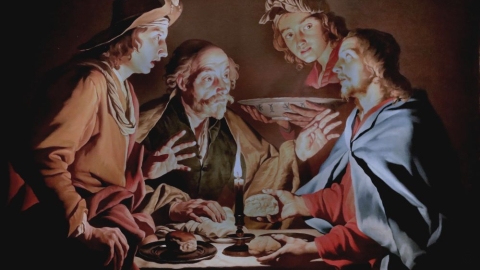Pope Francis Encourages World Peace

Pope Francis sent a message to participants of Martin Luther King Jr. Day - a memorial service in honor of the life and accomplishments of the Baptist pastor - where he encourages all of God's children to be peacemakers.
Martin Luther King Jr.’s dream is “still current,” writes the Pope in a message sent on January 18, 2021 to participants in this commemoration (“Beloved Community Commemorative Service”) which closes a week of celebrations in the United States.
The Pope refers to the famous “I have a dream” speech given on August 28, 1963, inspired by Gandhi's principles and directed against American segregation practices.
“In today’s world, which must increasingly face the challenges of social injustice, divisions, and conflicts that hinder the achievement of the common good,” adds the Pope, “ Martin Luther King Jr.’s dream of harmony and equality for all peoples, achieved by nonviolent and peaceful means, still remains current.”
The Pope continues: “each of us is called to be a peacemaker, who unites instead of divides, who stifles hatred instead of nurturing it, who opens paths of dialogue instead of raising new walls,” citing his encyclical Fratelli tutti (no. 284).
“Only by striving daily to put this vision into practice can we work together to create a community built upon justice and fraternal love,” he said.
In no. 286 of his encyclical Fratelli tutti, the Pope cites Martin Luther King, Jr. as one his inspirations for this reflection on universal brotherhood.
This reflection itself is only an extension of the principles structuring Laudato si’, the encyclical on “integral” ecology. The central principle is the need for deep and urgent, but also universal, change. The Pope affirms in fact: “A strategy of real change requires rethinking all the processes” (no. 197).
This vision relates to the common good. For the Pope, it means: the social conditions of this good, or even collective goods, or even nature. All these designations are insufficient or incorrect.
By definition, the common good is a good realized in common, therefore an end. It is essential that it be the true good of man. Joining forces to promote trade or defend the planet does not aim for the true good of man, which is the beatitude achieved by the practice of virtue (at the natural level), and above all supernatural beatitude, by grace. This is the key flaw in the encyclical Laudato si’.
At the political level, this common good appears as a socializing globalism, which is based on the consciousness of interdependence, the preference for the poor, and ecological justice between nations. Claiming to achieve a just world “for tomorrow” rests on an illusion of liberal and Masonic inspiration, of the socialist type. It is a rejection of the Kingship of Christ and His grace.
At the social level, which includes economics and technology, the common good materializes in a paradisiacal eschatology. This affirmation bears witness to this: “We are called to be the instruments of God the Father so that our planet may be what He dreamed of when creating it, and so that it responds to His project of peace, beauty, and plenitude.”
To do this, we must establish a new synthesis through the awareness of forming a universal family and through ecological solidarity.
Our Lord Jesus Christ never presented His kingdom as the restoration of Edenic bliss. This vision is opposed to the Gospel, and presupposes a kind of millennialism.
On a personal level, participation in the common good is presented as an act of charity and “an intense spiritual experience.” It requires individual progress, personal and social virtues. But how can it be accomplished without grace and conversion?
This is indeed the most serious utopia: a characterized and inextirpable Pelagianism. The general “conversion” to which Francis aspires is conceived without the help of God. Of course, Catholics are called to live it in their religion, but how can we envisage a “civilization of love,” a “universal fraternity,” or a “new synthesis” without grace?
It is to forget and despise the universal Kingship of Christ, the only One capable of restoring wounded man, of giving him divine charity for himself and towards his neighbor, and prudence for the respect of creation. It is to seek solutions outside of the Cross of Jesus and His sacrifice, alone capable of providing man with true justice and true peace.
(Sources : cath.ch/Vatican.news/Zenit.org - FSSPX.Actualités)



